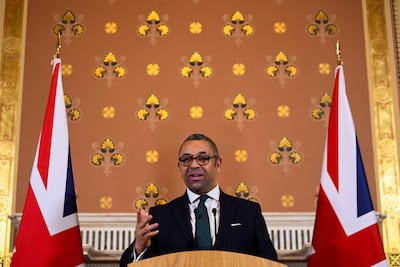Iran and Russia’s “sordid deals” over weapons that are killing Ukrainian civilians have been condemned by Britain’s Foreign Secretary in a raft of new sanctions against individuals.
James Cleverly said he was imposing the punishment on Tehran for its “brutal repression” of its people and “the threat it poses” to stability in the Middle East.
It has also been disclosed that Russia is now supplying an "unprecedented level" of both military and technological support to Iran enhancing its arsenal, western officials have told The National.
The new sanctions target the Iranian Mado company that specialises in building aircraft engines for the Shahed 136 kamikaze drones that have been widely used to attack targets in Ukraine.
Among those placed under sanctions are Mado co-owner and managing director Yousef Aboutalebi, head of the Iran Aviation Industries Organisation Prof Afshin Khajeh Fard and Islamic Revolutionary Guard Corps Brig Gen Abdollah Mehrabi.
Sanctions have also been applied to a dozen Russian officers said to be involved in civilian killings.
They will all be subject to travel bans and asset freezes outside their home countries.
It was now clear that Iran had become one of Russian President Vladimir Putin's top military backers but at the same time Moscow had promised to provide Tehran with advanced military components, the Foreign Office said.
“This is increasing the risk to Middle East and international security,” said Mr Cleverly
. “We will expose this sordid deal and hold both countries to account.”
He added that the “calculated attacks on cities and innocent civilians” would “not go unanswered”.
“The Iranian regime is increasingly isolated in the face of deafening calls for change from its own people and is striking sordid deals with Putin in a desperate attempt to survive,” he said.
“Putin wants to break Ukraine’s spirit, but he will not succeed.”

Announcing the sanctions, the Foreign Office stated that Tehran’s “brutal repression” of its population and threat to peace in the region had left it internationally isolated and in “desperate need of support” from Mr Putin.
Activists say more than 500 people have been killed since a wave of protests began in Iran on September 16, with about 18,000 detained. At least two people involved in protests have been executed.
Protests were sparked by the death of Kurdish Iranian Mahsa Amini, 22, in the custody of the morality police. She had been detained in Tehran for wearing her hijab “improperly”.
The Foreign Office also used strong language on imposing sanctions against 12 high-level Russian officials implicated in the “campaign of terror against Ukraine” striking crucial energy infrastructure that had plunged civilians “into the dark and freezing cold of winter”.
The officers include Major General Robert Baranov, who was identified by the Bellingcat news website as the commander of a unit responsible for targeting Russian cruise missiles.
It is also apparent that Russia is now supplying arms and manufacturing skills to Iran as part of the drone deal.
“Russia is offering unprecedented level of military and technical support to Iran," a western official said. “It is clear that there is a greater level of support than we've seen before from Russia to Iran.”

More than 6,000 Ukrainian civilians have been killed since Russia invaded in February, mostly from missile and artillery strikes.
Mr Cleverly described the attacks on cities as “abhorrent strike against civilian targets” and “evil attacks” by Iranian-manufactured drones.
The Foreign Office warned that intentional attacks against civilians was a serious violation of International Humanitarian Law and “those responsible must be held to account”.
It argued that sanctions were “taking the wheels off the Russian war machine” forcing the Kremlin to compromise on vital weaponry.
The UK’s Defence Intelligence agency has also reported that sanctions have meant that the Russians were struggling to replenish their missile reserves, instead relying on “second rate drones supplied by Iran to keep up their inhumane bombardments” on Ukraine.


























